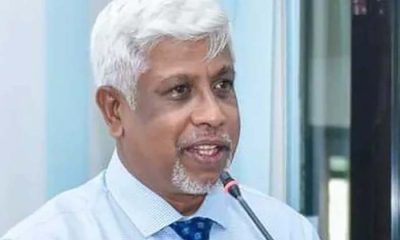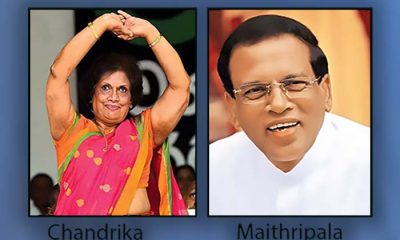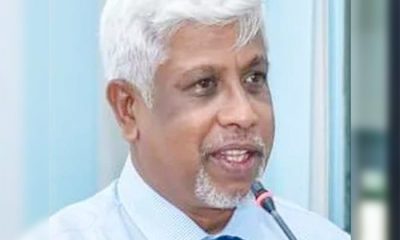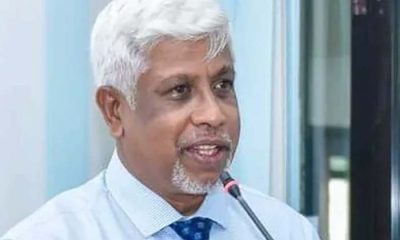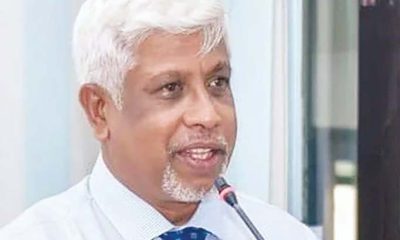News
EC seeks Rs 30 bn for polls next year

By Rathindra Kuruwita
The Election Commission (EC) has asked the Treasury for Rs. 30 billion for elections in 2024, Commissioner General of Elections (CGE), Saman Sri Ratnayake says.However, the Constitutional Council (CC) had not yet appointed all members to the Elections Commission, Ratnayake said.
According to the CGE, only four out of five members have been appointed to the EC so far.Given that the quorum was only three, the commissioners were carrying out their duties and functions, Ratnayake said, adding that the Presidential Commission of Inquiry tasked with investigating existing election laws and regulations and recommending changes had not yet approached the EC for discussions. President Ranil Wickremesinghe appointed the commission.
Ratnayake added that a few years before the Commission had sought public opinion on changes to the election laws.
“We believe that deposits should be increased for those contesting presidential, general and provincial council elections. We have proposed this. Steps are being taken to draft a law.” he said.
A candidate from a political party contesting for a provincial council does not need to place a deposit, he said. The Commission has suggested that such a candidate place a deposit of 10,000 rupees that will be repaid and a 1,000 rupee deposit that will not be rebated.
“We also suggested the same for a candidate from a political party contesting the general elections. We believe that a person contesting the presidential election must make a deposit of 2.6 million rupees. 2.5 million rupees of the deposit will be repaid following the election. We also suggested that an independent
candidate must place a deposit of 3.1 million rupees, out of which 3 million rupees will be returned.”
Thirty five candidates contested the 2019 presidential election. In 2015, there were 19 candidates, Ratnayake said.
“Most people don’t understand how the number of candidates affects our expenses. The length of the ballot paper is determined by the number of candidates, which in turn determines how many ballot papers can be accommodated in a ballot box. The number of ballot boxes we need determine the size of the polling centre. It also determines what kind of a vehicle is needed to transport ballot boxes to a polling centre. We also need to treat all candidates equally, which means more staff. Spending a lot wouldn’t matter if there was real competition among these candidates, but we all know that there are only a handful of real players involved,” he said.
The Commissioner General of Elections added that they have asked the Treasury to allocate funding to hold a presidential, provincial, and local government elections in 2024.
“There are no scheduled elections in Sri Lanka. Provincial councils have not been held for years, but those in power can hold them anytime they want. So in the past few years, when a Budget is being prepared, and we are asked by the Treasury to provide an estimate, we always ask for funding to hold the provincial elections. We have asked for 30 billion rupees for these elections. We have also told the Treasury that a general election will cost 11 billion rupees. If the President dissolves Parliament, he is anyway bound by the Constitution to provide us with money,” he said.
News
“We welcome investors and tourists visiting Sri Lanka who contribute to strengthening economic and cultural ties”– PM

Prime Minister Dr. Harini Amarasuriya stated that as Sri Lanka moves towards sustainable growth, the country welcomes investors and tourists who contribute to strengthening economic and cultural ties.
She made these remarks while addressing a special celebration and dinner reception organized by the Sri Lanka India Society to commemorate the 77th Republic Day of India and the 78th Independence Day of Sri Lanka, held on Thursday [February 26] at the Taj Samudra Hotel in Colombo.
During the event, the official magazine of the Sri Lanka India Society was launched, and the book “Port of Call” was presented to the Prime Minister and the Indian High Commissioner.
Addressing the gathering, Prime Minister Dr. Harini Amarasuriya noted that the Sri Lanka India Society since its establishment in 1949 has contributed to strengthening relations between the two nations, through cultural engagement, dialogue, and sustained interaction. The Society has supported ties not only between the two governments but also between the peoples of both countries.
She further stated,
“Over the past year, the strength of India–Sri Lanka bilateral relations has been evident. I express gratitude for the support extended by the Indian government in facilitating the exposition of the sacred Devnimori relics in Sri Lanka.
When Cyclone Dithva affected Sri Lanka, India responded promptly through “Operation Sagar Bandhu,” providing assistance in the rescue and relief efforts.
I appreciated the announcement of a long-term relief package amounting to USD 454 million in support of Sri Lanka’s recovery efforts. India continues to work closely with Sri Lanka in its journey towards sustainable development.
The Sri Lanka–India partnership spans multiple sectors, including economic development, energy, connectivity, trade and investment, digital transformation, health, education, maritime security, and people-to-people ties.
As Sri Lanka progresses towards sustainable growth, we welcome increased investments from Indian businesses and greater tourist arrivals from India, while further strengthening our economic and cultural ties”.
She reaffirmed that India is Sri Lanka’s closest neighbour and an important partner, Sri Lanka is committed to advancing cooperation for the benefit of the people of both countries and the wider region.
Speaking at the event, Indian High Commissioner Santosh Jha stated that the relationship between the two countries goes beyond formal diplomacy and is a strong and special partnership. He noted that the introduction of the first international degree offered outside India in Sri Lanka marked a new chapter in educational cooperation. He also highlighted the continued expansion of collaboration in connectivity and people-to-people relations, adding that India–Sri Lanka relations are experiencing significant growth in the current period.
The event was attended by ambassadors, diplomats, officials of the Indian High Commission, and government representatives.
[Prime Minister’s Media Division]
News
Chief Sanghanayaka of Sabaragamuwa Province felicitated

The “Gauravabhinandana” ceremonial felicitation was held in honour of the Chief Sanghanayake of the Sabaragamuwa Province of the Malwathu Maha Vihara Chapter of the Maha Vihara tradition of the Siyamopali Maha Nikaya; former Pirivena Examiner; Rajakiya Pandith; holder of Master; Scholar of classical texts; recipient of the Kala Bhushana title; Vinaya Keerthi Sri Dhammdinna Saranapala; the Most Venerable Kaeligama Vijithananda Nayaka Thero on Wednesday [25th of February] at the auditorium of the Rathnapura District Secretariat
The event was organized under the patronage of the Anunayake of the Malwathu Chapter of the Siyamopali Maha Nikaya, Most Venerable Acharya Agga Maha Panditha Niyangoda Dharmakeerthi Sri Sangharakkhitha Vijithasiri Abhidhana Anunayake Thero.
The presentation of the symbolic casket to the Most Venerable Kaeligama Vijithananda Nayaka Thero took place with the participation of Prime Minister Dr. Harini Amarasuriya and the Governor of Sabaragamuwa Province, Ms. Champa Janaki Rajaratne.
Addressing the gathering, the Prime Minister stated:
“It is a privilege for me to participate in this felicitation ceremony held in appreciation of the religious and social service rendered by the Chief Sanghanayaka of the Sabaragamuwa Province, Most Venerable Kaeligama Vijithananda Nayaka Thera.
When we reflect on his life journey, it serves as a profound inspiration to us all. Having entered monastic life as a disciple of the Sabaragamuwa prelate, the late Most Venerable Kelle Sri Saranananda Thero, the Nayaka Thera has now rendered over five decades of distinguished service following higher ordination.
After obtaining a Bachelor of Arts degree from the Vidyodaya University, he devoted several decades as a Pirivena teacher and examiner, enlightening thousands of students. He has also authored numerous scholarly works. His classical literary contributions, especially for students of Pirivena education, are of exceptional value”.
The Prime Minister further recalled with gratitude the commitment shown by the Nayaka Thera, centred around the Ratnapura Mahawala Sri Dharmayathana, to uplift the spiritual and social well-being of the local community, and extended her wishes for good health and long life for the continuation of his invaluable service to the Buddha Sasana.
The occasion was also graced by the presence of Most Venerable Karagoda Uyangoda Maithreemurthi Thera, Supreme Mahanayaka of the Sri Lanka Amarapura Maha Sangha Sabha; the Anunayaka of the Sri Lanka Ramanna Maha Nikaya, Waleboda Gnanissara Thera; Lecturer of the University of Peradeniya and Deputy Registrar of the Malwathu Chapter, Panditha Mahawela Dhammakkhanda Rathanapala Thera; the Chief Sanghanayaka of Ratnapura and Uva Wellassa and former Vice-Chancellor of Uva Wellassa University, Bethgamuwa Dhammadinna Thera; along with members of the Maha Sangha. The occasion was also attended by the Minister of Buddhasasana, Religious and Cultural Affairs Sunil Senavi, Governor of Sabaragamuwa Province, Ms. Champa Janaki Rajaratne, Member of Parliament Shantha Padmakumara, former Members of Parliament A. A. Wijethunga and Janaka Wakkumbura, Ratnapura District Secretary Chinthana Udaya Nanayakkara, Basnayake Nilame of the Maha Saman Devalaya Ishan Sanka Mapitigama, Mayor of Ratnapura Indrajith Katugampala, and many other distinguished invitees.



[Prime Minister’s Media Division]
News
Sajith raises fresh concerns over toxic pollutants emanating from burning of substandard coal

Opposition and SJB Leader Sajith Premadasa yesterday raised serious concerns over the Government’s importation of substandard coal, warning that its use has resulted in inefficient electricity generation, increased equipment damage and significant financial losses to the State and consumers.
In a video statement, the Opposition Leader said the SJB had exposed details regarding the importation of inferior-quality coal, prompting what he described as an admission by Government representatives that the coal in question was of poor standard.
Premadasa charged that the continued use of such coal has reduced generation efficiency at the Norochcholai Power Station, while increasing the likelihood of damage to critical equipment.
He further claimed that ash content had risen sharply, from the accepted 11–15 percent range, to over 21 percent, doubling the volume of toxic pollutants generated. The disposal of the excess ash, he said, poses additional environmental risks.
The Opposition Leader also noted that a further 15 to 16 coal shipments are expected to arrive within the next two to three months. However, he alleged that the failure to procure high-quality coal has reduced megawatt output, necessitating greater reliance on fuel-powered plants to bridge the shortfall.
“This results in financial losses to the country, the Government, and, ultimately, to electricity consumers,” he said.
Premadasa cited Section 30 of the Electricity Act of 2009, maintaining that consumer tariffs can only be imposed, based on efficient electricity generation. He urged the Public Utilities Commission of Sri Lanka to safeguard the rights of the country’s 7.5 million electricity consumers, insisting that losses stemming from inefficient generation cannot lawfully be passed on to the public.
He further alleged that the Government’s promised “system change” had, instead, resulted in questionable coal procurement deals. The financial losses incurred through, what he termed, corrupt transactions, he argued, could have been channelled into essential public services, such as education, healthcare, poverty relief and support for entrepreneurs.
Premadasa called not for the appointment of a committee of experts, but for a full forensic audit into the transactions surrounding the coal imports.
He stressed that the SJB would continue to stand in defence of electricity consumers and asserted that the President and Cabinet must accept responsibility for the damage allegedly caused to the Norochcholai power plant, which, he described, as a national asset.
-

 Features6 days ago
Features6 days agoWhy does the state threaten Its people with yet another anti-terror law?
-

 Features6 days ago
Features6 days agoReconciliation, Mood of the Nation and the NPP Government
-

 Features6 days ago
Features6 days agoVictor Melder turns 90: Railwayman and bibliophile extraordinary
-

 Features5 days ago
Features5 days agoLOVEABLE BUT LETHAL: When four-legged stars remind us of a silent killer
-

 Features6 days ago
Features6 days agoVictor, the Friend of the Foreign Press
-

 Business5 days ago
Business5 days agoSeeing is believing – the silent scale behind SriLankan’s ground operation
-

 Business5 days ago
Business5 days agoBathiya & Santhush make a strategic bet on Colombo
-

 Features6 days ago
Features6 days agoBarking up the wrong tree




